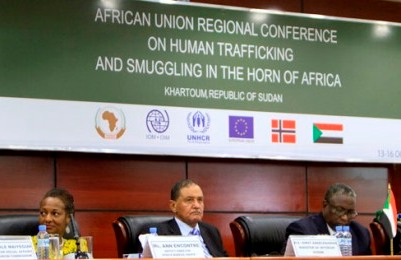Sudan calls for more support for efforts to combat human trafficking
October 16, 2014 (KHARTOUM) – Sudan has called for more support for its efforts to combat human trafficking in the Horn of Africa region, expressing its commitment to participate in regional and international efforts to fight the trans-national crime.

The meeting was attended by ministerial delegations from 15 countries and a large delegation from the European Union, with the US government also represented by its deputy chargé d’affaires in Khartoum.
Sudan’s vice-president, Hasabo Abdel Rahman, and interior minister Ismat Abdel Rahman participated in the opening of the ministerial meeting held on the fourth day of the conference before the adoption of a joint strategy and action plan.
The vice-president reiterated the Sudanese government’s commitment to combat human trafficking and expressed Sudan’s readiness to cooperate with neighbouring countries and the international community to end the practice.
In his speech, Rahman mentioned the efforts of his government to eliminate this crime, asserting that Sudan is a transit country for the traffickers.
Speaking in a press conference at the end of the conference, the interior minister went further to develop his position, saying the traffickers are active in refugee camps on the Eastern Sudan border areas.
He added that the Sudanese authorities took the necessary measures to control the camps and organise the process of entry and exist besides providing humanitarian assistance to the refugees.
Rahman told reporters that more than 70% of refugees in Sudan are located in the cities. He added that this situation make them vulnerable and requires improving their conditions inside the camps.
Ongoing political instability and conflict in the Horn of Africa makes the region volatile and insecure driving large number of people to quit their countries and cross to Sudan seeking to join Europe, Canada and USA.
This situation also created a market for smugglers and traffickers who request important amounts of money to facilitate their departure to their final destination.
In February, Human Rights Watch (HRW) accused traffickers in Eastern Sudan of torturing Eritreans for ransom.
The victims told HRW that Sudanese and Egyptian security officers facilitated trafficker abuses rather than arresting them and rescuing victims.
The Sudanese interior minister said his government signed a number of agreements with the neighbouring countries including Eritrea and Ethiopian and established joint border patrols aiming to combat such abuse.
He cited the joint actions conducted earlier this year by the Sudanese-Libyan force to curb trafficking operations.
The Sudanese parliament endorsed a bill last December on combating human trafficking and called for carrying out deterrent penalties including capital punishment and life imprisonment against those involved in those crimes.
In a speech delivered on Thursday, the deputy head of US embassy in Sudan, Benjamin Moeling, expressed his country’s readiness to support regional action against trafficking, adding that his government also supports the UNHCR and IOM’s joint strategy.
Moeling disclosed that an American delegation visited Khartoum and Eastern Sudan in September “and shared best practices”.
“In particular, we commended the government for passing anti-trafficking legislation and establishing a national coordinating body,” he said.
“Building off of those initial discussions, the United States looks forward to additional conversations with Sudan, and its partners, on how to further prevent, prosecute and protect against trafficking-in-persons,” he added.
(ST)
